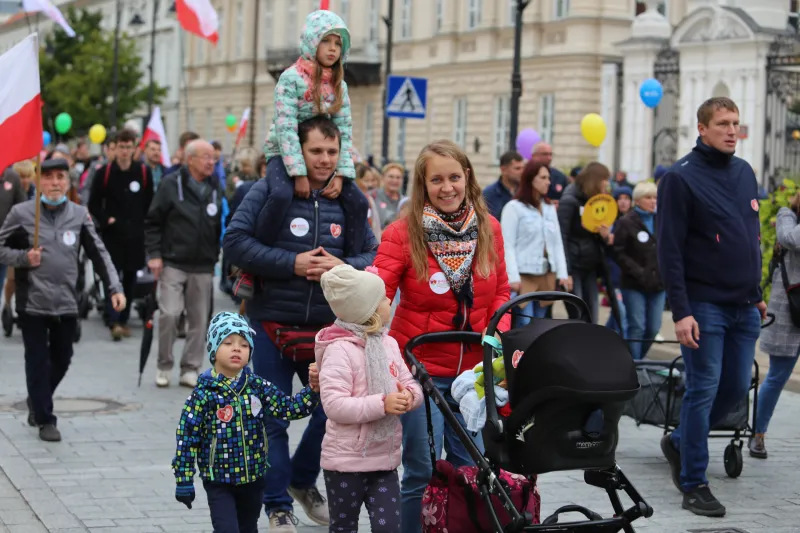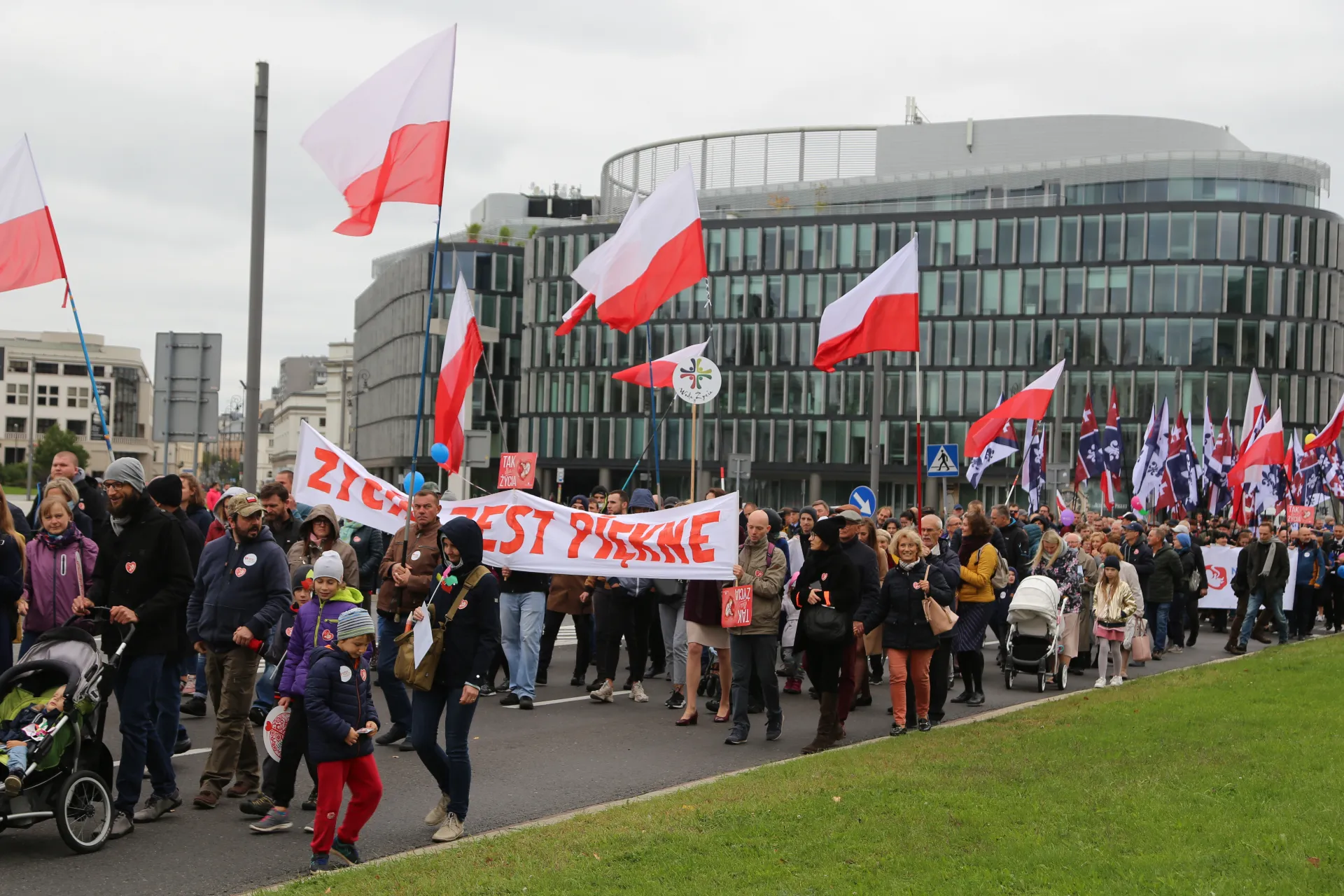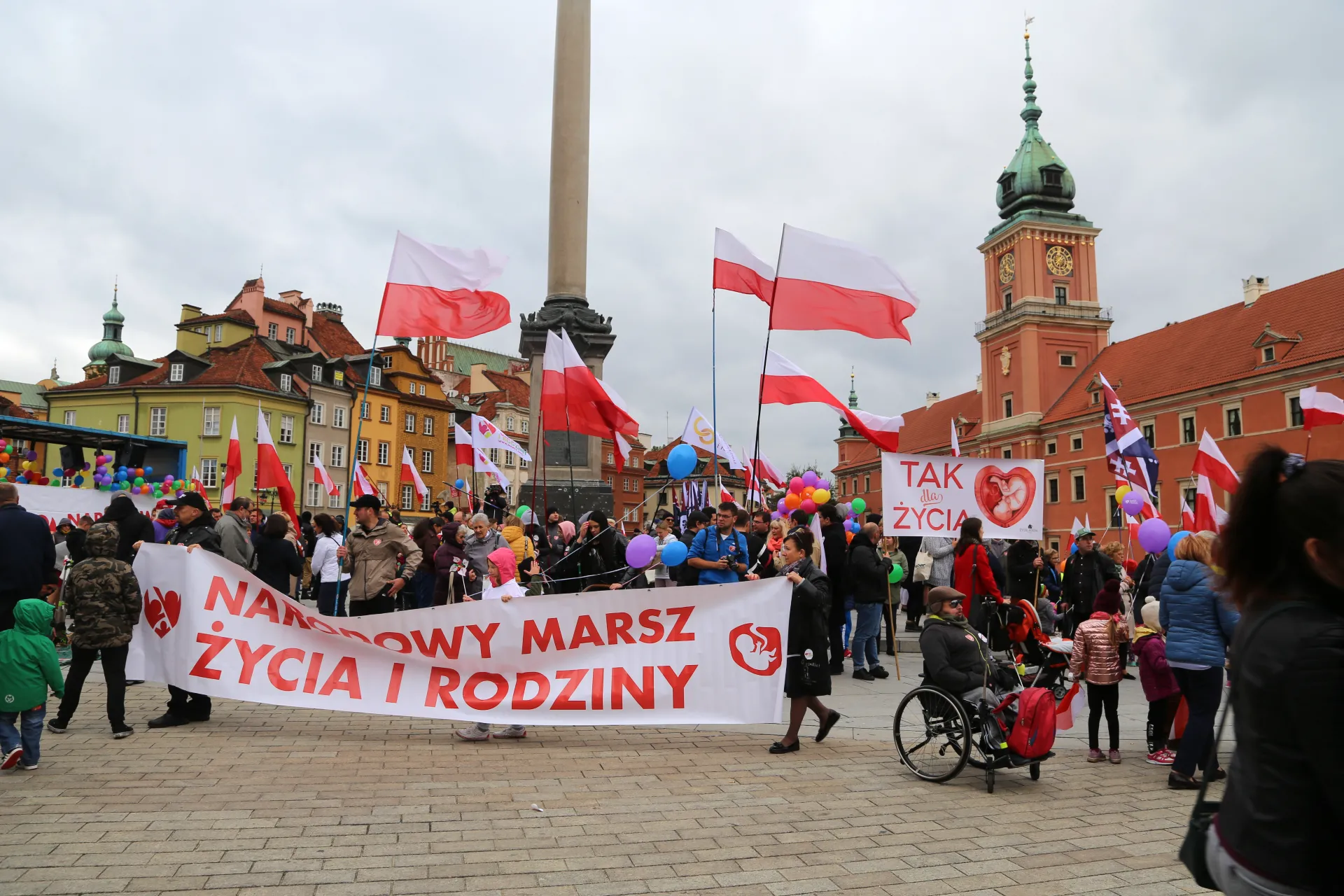
Archbishop Samuel Aquila, 71, is celebrating his tenth anniversary as Archbishop of Denver, the archdiocese in which he was ordained in 1976. He was born in Burbank, California, served as a priest in Denver for 25 years, and then served as Bishop of Fargo, North Dakota from 2001 to 2012. He returned to Denver in 2012. (He was interviewed in 2011 by Catholic World Report when he was Bishop of Fargo.)
The Archdiocese of Denver was established in 1887 and serves 609,057 Catholics with 149 places of worship and 338 priests. CWR recently spoke with Archbishop Aquila about the past decade, serving as Archbishop of Denver.
CWR: Have you had positive experiences since returning to minister in Denver?
Archbishop Aquila: Absolutely. It has been an incredible gift from the Lord, and one I did not expect. The Lord is always surprising us. I was very happy in Fargo, and I loved the people there. Then I received a phone call, and my life changed forever.
The experience taught me the importance of surrendering to the will of the Father, of seeking His will alone, and of dying to myself and my desires. I need to let my desires become one with the desires of the Father, Jesus Christ and the Holy Spirit. It gives me tremendous freedom, and it fulfills the Gospel “You will know the truth, and the truth will make you free.” [John 8:32]
It is in living the call to holiness that a virtuous life occurs. Throughout my 46 years as a priest, I have seen the hand of Providence and God leading me with each surrender I have made to the will of the Father, in seeking His will and not my own will.
CWR: How would you describe Denver’s people, culture and geography?
Archbishop Samuel Aquila: It is a very different place than it was in 1976, when I was ordained a priest, both in terms of the culture and its population growth.
The eastern part of the archdiocese is primarily rural, with the people there engaging in farming and ranching. The western part of the archdiocese up to the Utah border is the place for winter and summer sports such as skiing and hiking. You’ll find popular resorts there in places such as Vail and Aspen. There are also some very large ranches in the western portion of the state.
We also have the I-25 corridor that runs from the southern border of the diocese to the Wyoming border, which includes cities such as Denver, Boulder and Fort Collins. The whole area has grown tremendously. Our metro area has about 2.4 million residents; when I first came to Colorado in 1968, there were 600,000 people.
The Hispanic community makes up 54% of our diocese. Some are new immigrants. Other families have been here for decades, even back to the late 1700s and early 1800s. We have a large Vietnamese community and a large African community. These three groups make up the majority of our Catholics here.
We also have a Korean community and a Pakistani community; the Pakistani community members are considered refugees, coming to the U.S. for more freedom than they had in Pakistan.
Colorado itself is a very libertarian state. Many of its people are socially liberal and have surrendered to secular humanism. The challenges for the Church in this culture are great.
Earlier this year, our state legislature passed the Reproductive Health Equity Act, one of the most progressive and liberal abortion laws in the country. It stripped away the rights of the unborn child, which they refer to as the embryo or fetus, and made it legal to abort the child in the womb up to birth.
When I was ordained in 1976, Colorado was a Red State, where family values were strongly reinforced. (Although it had already begun to change. Colorado was the first state that liberalized abortion laws under Governor Dick Lamm in 1967.) The recent decades have seen many people from the West Coast and East Coast come to live here, and their presence has changed our culture tremendously.
CWR: How receptive has the Denver population been to the message of the Church in the past decade?
Archbishop Aquila: Our church population is in decline, but not by a huge amount, maybe 2 or 3% in recent years. That said, we do see some real pockets of revitalization, particularly in the area of Catholic education. Our archdiocesan school system is very strong, an area I’ve emphasized in the decade I’ve been archbishop, continuing the work of my predecessors, Archbishops Stafford and Chaput.
We continue our work of evangelization by going out to the peripheries, inviting people to accept the truth of the Gospel and proclaiming Christ. We have strong Neocatechumenate communities here whose members evangelize. We’re also blessed to have Christ in the City to help and evangelize our homeless; they do incredibly good work carrying out the corporal works of mercy for them. And, we have other great groups. These groups go back to the basics, helping people experience an encounter with Jesus Christ.
We also have wonderful revitalization going on in our parishes, where it all boils down to the leadership of the pastor. We discover that when the Gospel is presented wholly, truthfully and charitably, and people are being accompanied in their encounter with Jesus Christ, we see tremendous growth. We need to ask these people: Who truly is my God? Have I surrendered my life completely to Jesus Christ? This means your entire heart, mind, will and soul.
We also need to help people encounter Christ in the sacramental life of the Church and the community of the parish.
CWR: How are vocations to the priesthood and religious life?
Archbishop Aquila: We have been blessed. In the years I have been archbishop, we have been ordaining classes of three to eight to the priesthood. We have between 50 and 60 seminarians, and have been as high as 70. We definitely need new priests; I have opened two new parishes because of population growth. Whereas parishes in years past had two, three or four parochial vicars, they are now fortunate to have one or two. Many parishes have one priest only.
As far as religious life, we’ve had men enter the Disciples of Jesus and Mary, the Jesuits and the Capuchins, who are present in the archdiocese. Our young women have been entering the Sisters of Life, the Nashville Dominicans, the Religious Sisters of Mercy, the Little Sisters of the Poor and the Benedictine Contemplative Nuns of the Abbey of St. Walburga. The Benedictines are a cloistered community, and they spend their lives praying, farming and ranching.
CWR: Do you have any major initiatives occurring in the archdiocese?
Archbishop Aquila: As an archdiocese, we’re really trying to understand what it means to be a disciple of Christ in today’s world. I asked our people to read an essay from the 2020 book From Christendom to Apostolic Mission from the University of Mary to start this discussion. The supports for Christianity in our culture have deteriorated. The culture no longer supports Judeo-Christian values. How do we evangelize? Our culture is similar to apostolic times, when Christians were confronted with a hostile pagan culture worshipping false gods. Today’s false gods are different, however. We see such false gods as secular humanism, atheism, materialism, and nihilism.
So our greatest initiative is seeking the conversions of mind and heart to Jesus Christ. That is what it means to have apostolic mission and to have a common mission within the archdiocese. Our mission is that in Jesus Christ all might be rescued and have abundant life for the glory of the Father. From there, we need to look at what it means to have a biblical world view. As Christians, we have to ask ourselves, do we really have a Christian world view? Are we completely surrendering all to Jesus Christ?
This past Advent, from Christ the King Sunday through Christmas, I asked our parish priests to preach on kerygma.
CWR: Can you explain that a bit more?
Archbishop Aquila: Kerygma is a Greek term meaning proclamation and herald. It sums up the basic Gospel message.
We are created by God. In His love, He has created us. Creation is beautiful. But there was the fall. Humanity was captured by the devil who entered into the world. Humanity listened to the father of lies. But, the Good News of the Gospel is that Jesus Christ has rescued man from being captured. In our encounter with Jesus Christ, we are freed from sin, death and the devil. It encompasses the basic Christian message.
CWR: What are your thoughts on the U.S. Supreme Court’s Dobbs decision, which overturned the Court’s 1973 Roe? Did you ever think you’d see the day?
Archbishop Aquila: No, I did not think I’d live to see Roe overturned, as much as it was something for which I’d worked and hoped. Both liberal and conservative legal scholars have argued that Roe was a poor decision legally and constitutionally, but I have always argued the issue from the point of view of science. Every one of our lives began at conception in the womb, and each life has a dignity and value, and no one has the right to take that innocent human life.
CWR: Colorado’s state government is determined to keep abortion legal, passing the Reproductive Health Equity Act earlier this year.
Archbishop Aquila: Yes. It is sad. It breaks my heart to see how cavalierly people treat abortion, as if it were nothing. They see no value in the life of the unborn child, and no dignity in that unborn child.
CWR: You and your brother bishops in Colorado asked Catholic legislators who voted for the Act to abstain from receiving Holy Communion. What reaction did this request receive?
Archbishop Aquila: Like anything, there were two sides. Some were strongly supportive, appreciated what we said [in] calling them out on their actions. Others accused us of politicizing the issue. That is the furthest thing from our intention.
We are concerned about the salvation of the souls of these Catholic legislators. Is Jesus Christ Lord of their minds, hearts and wills? Have they surrendered everything to the Lord? If they did, they’d be pro-life across the board.
CWR: Why this approach, rather than formally refusing Communion to these legislators?
Archbishop Aquila: We took this approach because I had not met with these legislators, explaining how their vote goes against their Catholic faith.
CWR: You also advocate against the death penalty. The death penalty is outlawed in Colorado, and the last execution there took place in 1997. Why have you spoken out on this issue?
Archbishop Aquila: I have written columns on this topic: it undermines the dignity of the human person, and says that the human person cannot change. It was always seen as a way for society to defend itself, and certainly an element of justice, taking the life of the criminal because a life was taken away. But I think there are extenuating circumstances, and that such a person should instead receive life imprisonment.
Many criminals come from broken, dark situations in which the Evil One has captured them. And, in light of our modern incarceration system, it is possible to keep a person in jail for life and hope for that person’s conversion and change of heart. That was the approach of Charles Colson when he engaged in prison ministry.
CWR: The Vatican had the death penalty on the books until 1969. Popes as late as Pius XII acknowledged the legitimacy of the death penalty in certain circumstances. What changed?
Archbishop Aquila: I think that was a mistaken viewpoint in terms of showing the mercy of God, and that the incarceration system of years past was lacking as compared to today.
CWR: You’ve spoken on the importance of the Eucharist to the Faith. The USCCB’s Committee on Evangelization and Catechesis has kicked off a National Eucharistic Revival. Why do you think this effort is important, and what results do you hope to see?
Archbishop Aquila: I think it is important because it will help people come back to faith in the Eucharist. While it is true that some people don’t understand the teaching of the Church as rooted in John 6, I think others understand it and do not believe. Regardless, it is critical to bring back more people to the belief that when they receive the Eucharist, they are receiving the Second Person of the Blessed Trinity body, blood, soul and divinity. The Eucharist is a gift he gave to us to nourish us in holiness and to make ourselves a total self-gift to the Father as Jesus made Himself a total self-gift to the Father.
CWR: You co-signed a fraternal open letter to the bishops of Germany about their German “Synodal Path”. In remarks to EWTN, you expressed your concern that documents related to it had no reference to Jesus Christ or Sacred Scripture, and had a worldly viewpoint rather than a Christian worldview. What reaction has your open letter had, particularly among the German bishops?
Archbishop Aquila: There have been a few German bishops who have responded, some agreeing with me, others disagreeing.
But I believe what they are doing is based on human decisions, not the Gospel. In reading these documents, you hear a lot about the world, but very little about the Gospel and the Holy Spirit. They take the solutions of the world and apply them, rather than those of the Gospel and Holy Spirit.
One bishop, in fact, shared that he did not believe that tradition is binding. If that is the case, it would make us very Protestant.
CWR: The Archdiocese is home to Augustine Institute and Real Life Catholic. What are your thoughts on the work of evangelization in Denver?
Archbishop Aquila: We are incredibly blessed. We have organizations such as the two you’ve mentioned, as well as the Fellowship of Catholic University Students, Endow, Christ in the City and some others I’m not remembering.
We also have some amazing parishes. All are contributing in incredible ways to proclaiming the Gospel, and fulfilling the Vatican II directive that the laity serve as leaven in the world.
CWR: Any final thoughts?
Archbishop Aquila: Yes. If anyone would like to read more on my thoughts on these issues we’ve discussed as well as many others, I would invite them to visit our archdiocesan website.
(Editor’s note: This interview has been edited slightly for length and clarity.)
If you value the news and views Catholic World Report provides, please consider donating to support our efforts. Your contribution will help us continue to make CWR available to all readers worldwide for free, without a subscription. Thank you for your generosity!
Click here for more information on donating to CWR. Click here to sign up for our newsletter.










We read: “How do we evangelize? Our culture is similar to apostolic times, when Christians were confronted with a hostile pagan culture worshipping false gods. Today’s false gods are different, however. We see such false gods as secular humanism, atheism, materialism, and nihilism.”
The dewy-eyed optimism of the early 1960s blinded the Second Vatican Council to the corrupting onslaught that was coming only a few years later. Now, after sixty years we have a bishop in fly-over country clearly proclaiming the need for conversion and the gift of the Eucharist. This, in the multi-cultural mix of Hispanics old and new, Africans and Vietnamese…
(Ridden roughshod, however, by Aztecs in the state legislature.)
When St. Paul tried to graft Christianity onto the pagan religiosity of the Athenians, things got muddled. After his philosophical approach (like the Vatican II goal of trying to bridge between the biblical and the pagan modern world?), he changed his tune when he moved on to crossroads Corinth, e.g., “For Christ did not send me to baptize, but to preach the gospel, not with wisdom of words, lest the cross of Christ be made void. For the doctrine of the cross is foolishness to those who perish, but to those who are saved, that is, to us, it is the power of God” (1 Cor 1:17-18).
In the aftermath of the 20th century, one could almost say that Aquila remains an archbishop (like Cardileone and Gomez), rather than a cardinal, BECAUSE he and his pastors are unambiguously apostolic. Such is the “smoke of Satan” in the world today, and even in the Church—especially in “synodal” Germany…
But, St. Paul didn’t need a red hat either.
How important we cherish God’s incomparable gift and proclaim this to others. God uses sinful man to profess His goodness and it has worked to this day. That people can identify with us and see that we show Christ in our countenance and demeanour. That we spread the seed is vital.
2 Timothy 4:2 Preach the word; be ready in season and out of season; reprove, rebuke, and exhort, with complete patience and teaching.
2 Timothy 2:15 Do your best to present yourself to God as one approved, a worker who has no need to be ashamed, rightly handling the word of truth.
1 Timothy 4:13 Until I come, devote yourself to the public reading of Scripture, to exhortation, to teaching.
1 Corinthians 1:21 For since, in the wisdom of God, the world did not know God through wisdom, it pleased God through the folly of what we preach to save those who believe.
Mark 16:15 And he said to them, “Go into all the world and proclaim the gospel to the whole creation.
God bless you and thanks for putting your talents to the betterment of mankind
Thank you, Mr. Graves. It’s wonderful reading the thoughts of a Catholic Church leader who actually believes what the Church teaches.
Wherever did you find him?
(Although it had already begun to change. Colorado was the first state that liberalized abortion laws under Governor Dick Lamm in 1967.)(sic)
Lamm wasn’t elected Governor until 1974, serving from January 1975 – January 1987. John Love – a Republican – was Governor from January 1963 – July 1973.
You are correct. Abortion was legalized in Colorado before Dick Lamm was elected governor. The text of the interview should note this correction.